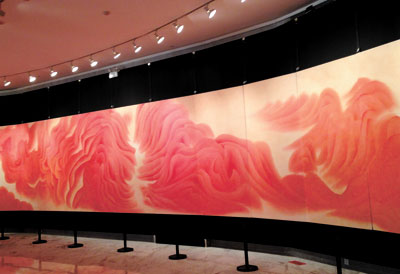|

Anna Zhao
anna.whizh@yahoo.com
MORE than 100 pieces of art by Lu Fusheng, a prominent academic and artist of traditional Chinese painting and calligraphy, are on exhibition at Guan Shanyue Art Museum until April 20.
The paintings clearly embrace traditional Chinese elements, such as human figures, landscape, flowers and animals. Lu goes well beyond a traditional interpretation by integrating his aesthetic appreciation and philosophical and humanistic expressions into his art.
Lu has an insightful perception of religion, space and the universe. He thinks modern art intends to emphasize intellectual elements and very often crosses the boundaries of abstractness and concreteness, reality and fantasy. Artists tend to draw inspiration from a conflicting cultural context of multiplicity, including Oriental and Occidental, tradition and modernism. The works on exhibition showcase his exploration between cultural contexts.
Lu’s work upholds traditions, but an overtone of modernism looms in it. That may have a lot to do with his education. He is among the few artists who received both an ancient-style private school education and a modern education. Lu knows well about painting, poetry, calligraphy and Chinese classics. Many of his paintings have close association with ancient classics, such as the “Book of Songs,” “Verses of Chu” and “Book of Changes.”
He says the ancient classics he read as a child often popped up in his mind so he would give different names to his works in association with classical verses. “The names may not suit my paintings, but they may awaken the audience’s creation potentials with visual images,” Lu said.
As a successful artist with a profound knowledge of art and aesthetic history, Lu is deft at weaving his knowledge into art creations, so his work is a fusion of abstract and concrete, traditional and contemporary expressions.
One of the most eye-catching pieces among the works presented at the exhibition is a painting named “Being and Space,” measured at an impressive 37.5 meters in length and 2.4 meters in height. Lu said he worked two years on the painting and has made huge modifications to it.
The picture portrays motion with undulating ridges and earthly red mountains in various shapes. Lu says traditional landscape paintings tend to be two types: narrow painting that can be perceived at one glance and lengthy scrolls that offer a dynamic view as it unfolds. He was inspired to create such a piece by combining the two together while preserving a sense of mobility.
Lu’s calligraphy work is characterized by a unique style of his own. Two calligraphy works on exhibition could hardly be understood if the explanations were omitted. Different from contemporary artists who design new character forms, Lu borrowed forms from different periods in history. He said he deliberately made it impossible for people to understand because he wanted his audience to concentrate on forms rather than contents.
“Calligraphy in ancient times was for the purpose of reading, but that era is over. Contemporary calligraphy has a more aesthetic value than reading. My calligraphy creates obstacles in reading so visitors can focus more on its aesthetic value,” Lu said.
The exhibition’s curator Wu Hongliang, who is also the president of the Art Museum of Beijing Fine Art Academy, said Lu’s paintings incorporate the heritage of tradition and new development in the contemporary world. He says Lu has brought new meaning to traditional landscape paintings by using the languages of fine brushwork and light color.
Time: 9 a.m.-5 p.m., now through April 20, closed Mondays
Venue: Guan Shanyue Art Museum, 6026 Hongli Road, Futian District (福田区红荔路6026号关山月美术馆)
Metro: Longgang or Longhua Line, Children’s Palace Station (少年宫站), Exit F2
|

